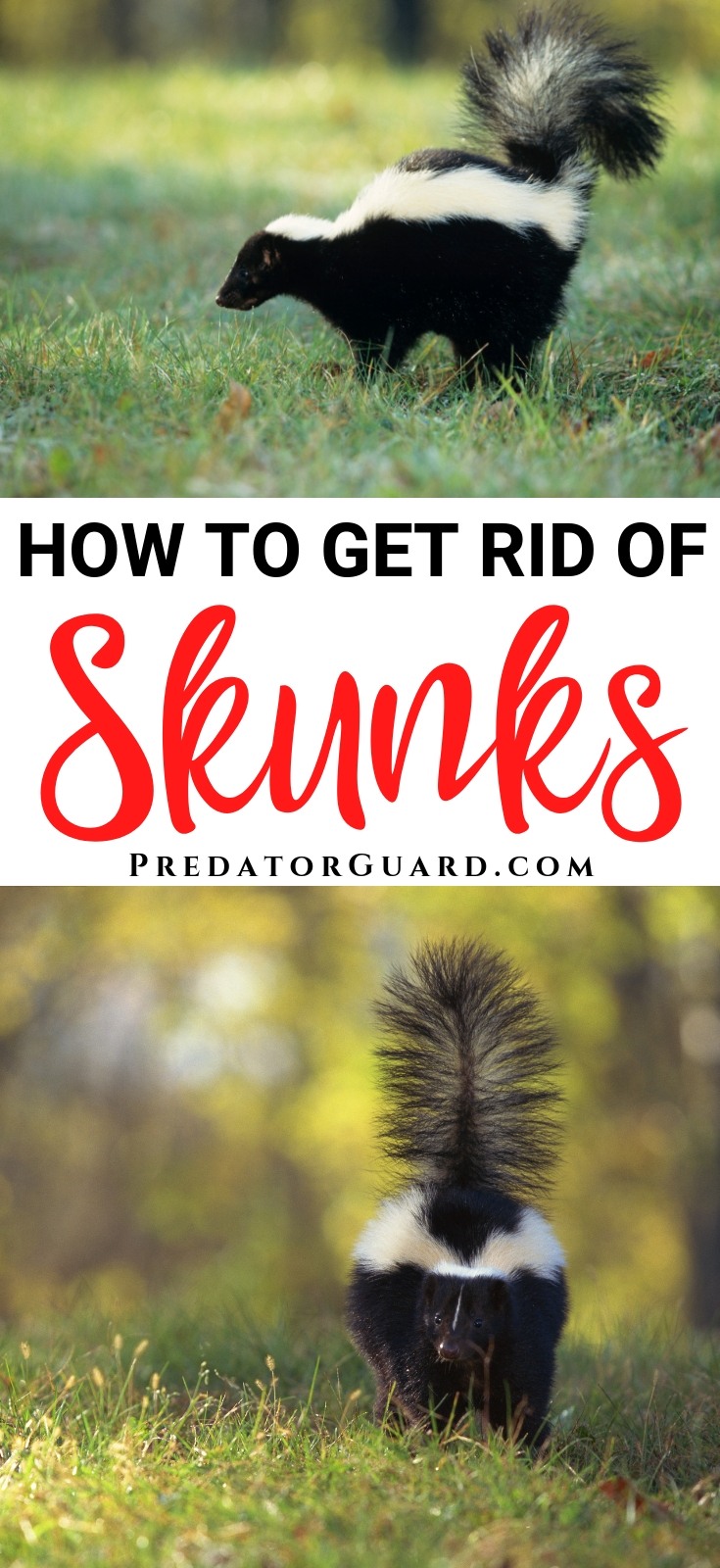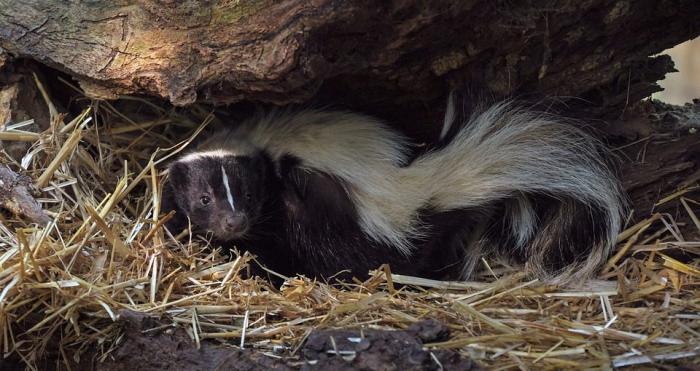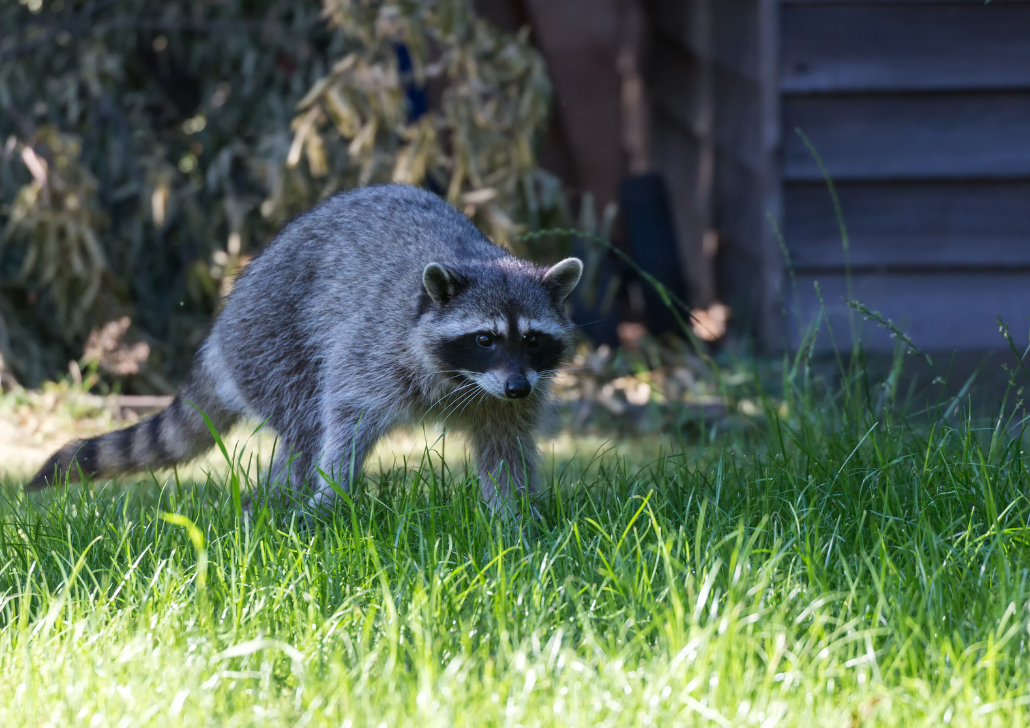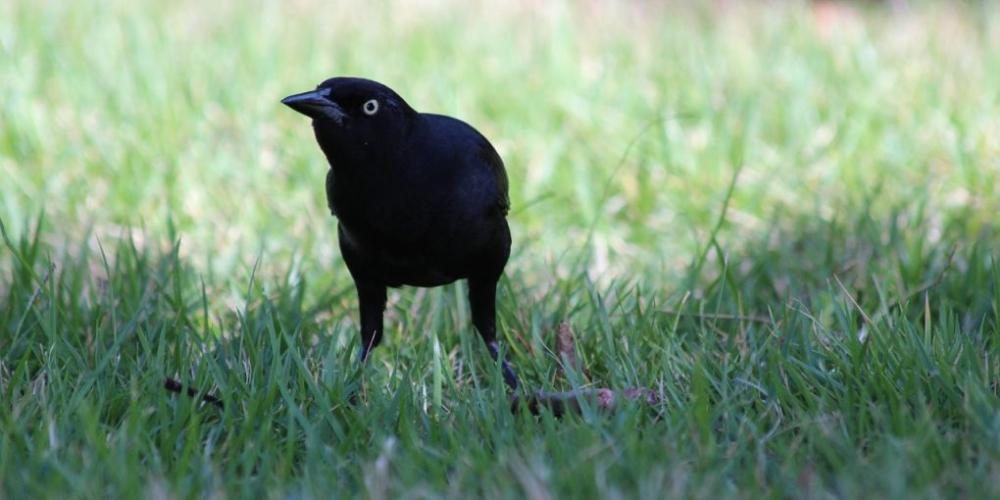Image by GuideYourPet https://guideyourpet.com/how-to-get-rid-of-skunks/
Learn how to get rid of skunks with these natural, non-lethal methods.
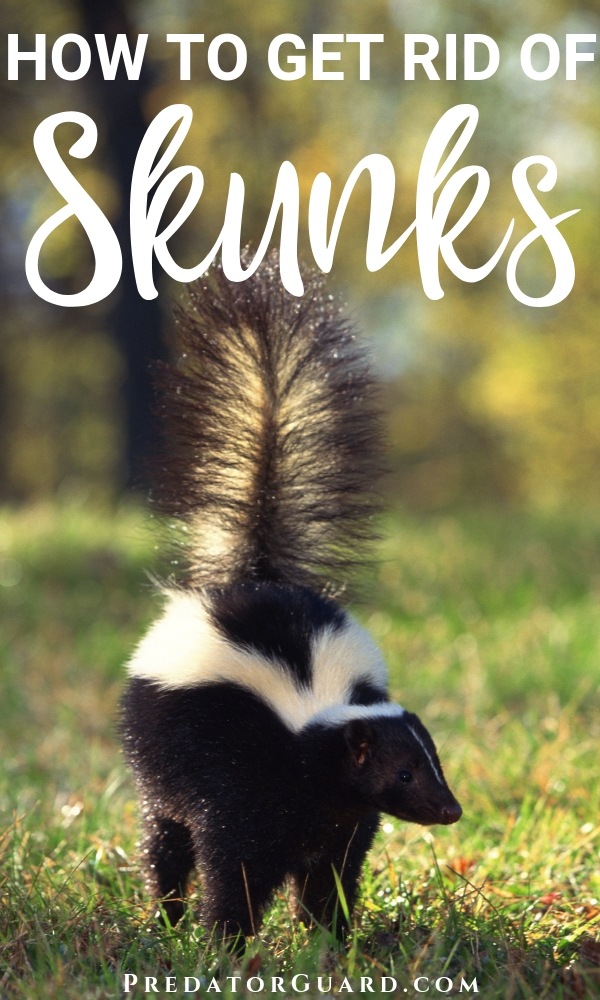

Skunks can be problematic when they decide to make themselves comfortable in your yard. They dig holes in search of insects, forage in gardens and trash, and for chicken owners - they pose a threat to chickens and their eggs.
They may also dig under your house or deck, causing damage to your home and its wiring. To top it all off, their spray is pungent and hard to get rid of of.
When deciding how to approach the removal of skunks on your property, you first need to understand that you run the risk of being sprayed, and plan accordingly.
There are a variety of critters that may be in your garden, so you'll need to identify that skunks are indeed your problem.
Identifying Skunks on Your Property
Skunks Eating Grubs
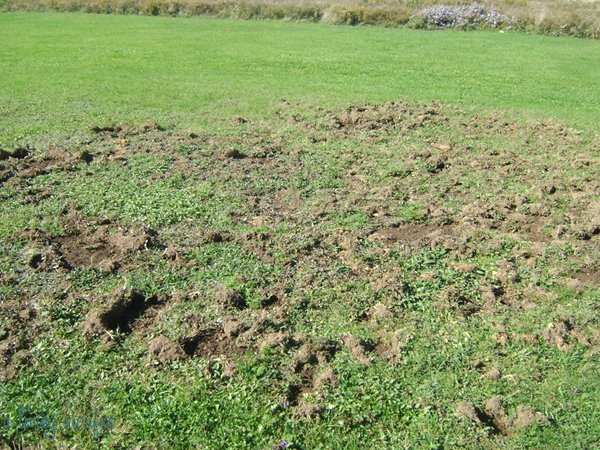
You may discover holes around your yard or along the edges or your home, from skunks searching for food. They like to burrow, and insects are a skunks' favorite food. If you're wondering how to get rid of skunks eating grubs, you might consider starting at the source. Eliminating the grubs using beneficial nematodes would be your best bet.
At times it may be hard to pin down whether there are skunks or raccoons in your yard, since both animals like to dig shallow holes in search of grubs.
Skunk Feces
You may or may not find skunk feces in your yard. It's typically about an inch or two long, with the remains of insects in it.
Skunk Spray
The number one way to tell if you have skunks on your property is if you smell their strong spray. It's pungent and unmistakeable!
It smells so badly because of the mixture of chemicals containing sulfur, called thiols.
When a skunk feels threatened or intimidated, they'll spray the area as a form of defense. Though they have poor eyesight, it's not so bad that they're not able to aim. Predators, pets, or really anything that spooks them may cause them to lift their tail and let out this nauseating spray.
What To Do When There Are Skunks In Your Yard or House
First you'll need to determine how bad the situation is. Do you suspect a skunk has delivered a litter of kits under your house? Or is it just a rogue skunk that made their way through your yard on a random night?
Depending on the situation, you may want to consider hiring a professional. If you decide to move forward on your own, proceed with caution, starting with the least invasive methods and working your way up to more invasive solutions.
What Attracts Skunks
Removing attractants in your yard is the best thing you can do to ensure the skunks don't stick around or continue coming back.
Pet Food
Skunks aren't above eating your pet's old food. Make sure you put it away, especially at night.
Garden Plants
Skunks are omnivores, so they also eat nuts, plants, and berries. If you have a garden growing, you may find some of it dug up and eaten.
Garbage
When times get tough, skunks have been known to dig through the garbage in search of scraps. Make sure your trash cans have tight-fitting lids, and don't leave any trash bags by your door.
Grubs, Earthworms, & Insects
If you garden, earthworms are great for your soil, so you won't want to eliminate them. But for grubs and other insects, you might consider getting rid of them so skunks aren't as attracted to your yard.
Shelter
Skunks are always searching for shelter, especially if a female is preparing to birth a litter of kits. If you see holes near your deck, or smell the faint scent of skunk spray, it's possible a skunk made a den on your property.
Chickens & Eggs
If you raise chickens, they may be attracting skunks to your property. And believe it or not, skunks can take out an entire flock of chickens, along with their eggs.
How To Get Rid of Skunks
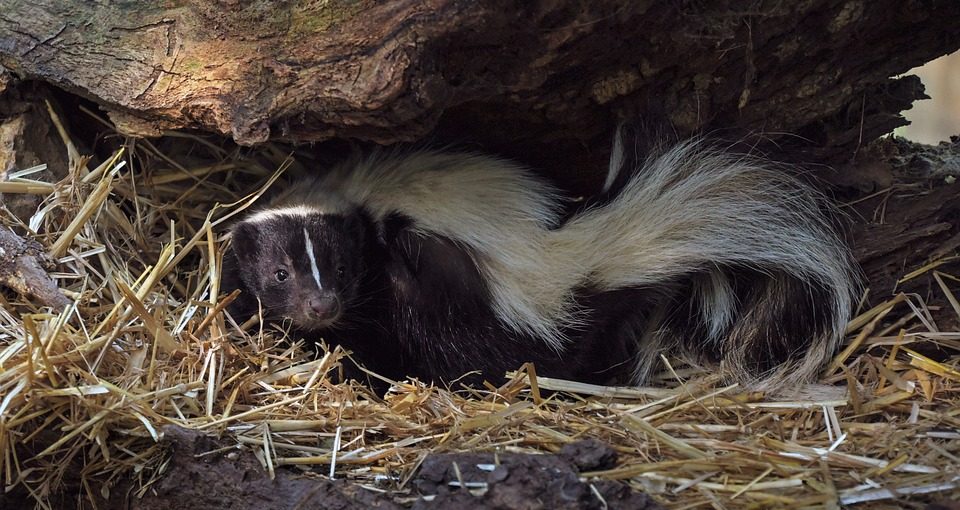
How To Get Rid of Skunks In Your Yard
Getting rid of skunks in your yard breaks down into fairly easy steps. The trick is to pinpoint exactly what's attracting them to your property, as well as which deterrents and repellents are most effective for your situation.
Step 1: Eliminate Attractants, as mentioned above
Step 2: Apply Skunk Repellents and Deterrents
Step 3: Check To See If The Skunks Have Left The Premises
Step 4: If The Skunks Still Remain, Adjust Repellents and Deterrents To Drive The Skunks Away
Step 5: Set Catch and Release Traps
Skunk Repellents and Deterrents
There are a few options available to you in terms of repelling and deterring skunks from coming onto your property. All options mentioned are 100% natural and safe, and will not harm the skunks, your garden, or any other animals.
Home Repellents For Skunks
Many people are curious about what home remedy will get rid of skunks. Some of these homemade repellents can work. However, if the skunks are comfortable enough, it may not be as effective.
Don't forget that with homemade repellents comes the responsibility of frequent applications, as the elements such as wind and rain easily wear down on the scent and taste.
- Homemade Skunk Repellent Spray (a mixture of hot peppers, onion, jalepeno, cayenne pepper, and water, boiled for a few minutes and strained.)
- Predator Urine (even the urine of your own pets can work if you're somehow able to collect it, or you can purchase predator urine at a variety of outdoor stores in your area.)
- Ammonia (place ammonia soaked rags in buckets around the perimeter of your yard.)
Please do NOT use chocolate as a skunk repellent. The theobromine found in chocolate is poisonous to skunks, as well as many other animals.
Moth balls are also commonly suggested, but they're highly toxic, with very little results.
Moth balls are also commonly suggested, but they're highly toxic, with very little results.
How To Get Rid of Skunks with Home Remedies
All of the above homemade skunk repellents should be applied daily until the problem subsides. If the skunks leave your property, you can cut back on the number of applications slowly, increasing when you suspect they may be starting to creep back.
However, there are better ways!
Deterrent Lights
Predator Guard's Solar LED Deterrent Lights are typically used to protect livestock animals from predators, but it's effective regardless.
Though the skunk's eyesight is not great, they will be able to see the two glowing LED lights, and will assume they're the eyes of a predator. Because the eyes do not move, it's unlikely that the skunk will spray the device. Instead, they'll likely just leave the area.
However, there are better ways!
Deterrent Lights
Predator Guard's Solar LED Deterrent Lights are typically used to protect livestock animals from predators, but it's effective regardless.
Though the skunk's eyesight is not great, they will be able to see the two glowing LED lights, and will assume they're the eyes of a predator. Because the eyes do not move, it's unlikely that the skunk will spray the device. Instead, they'll likely just leave the area.
Under Your House, Deck, or Shed
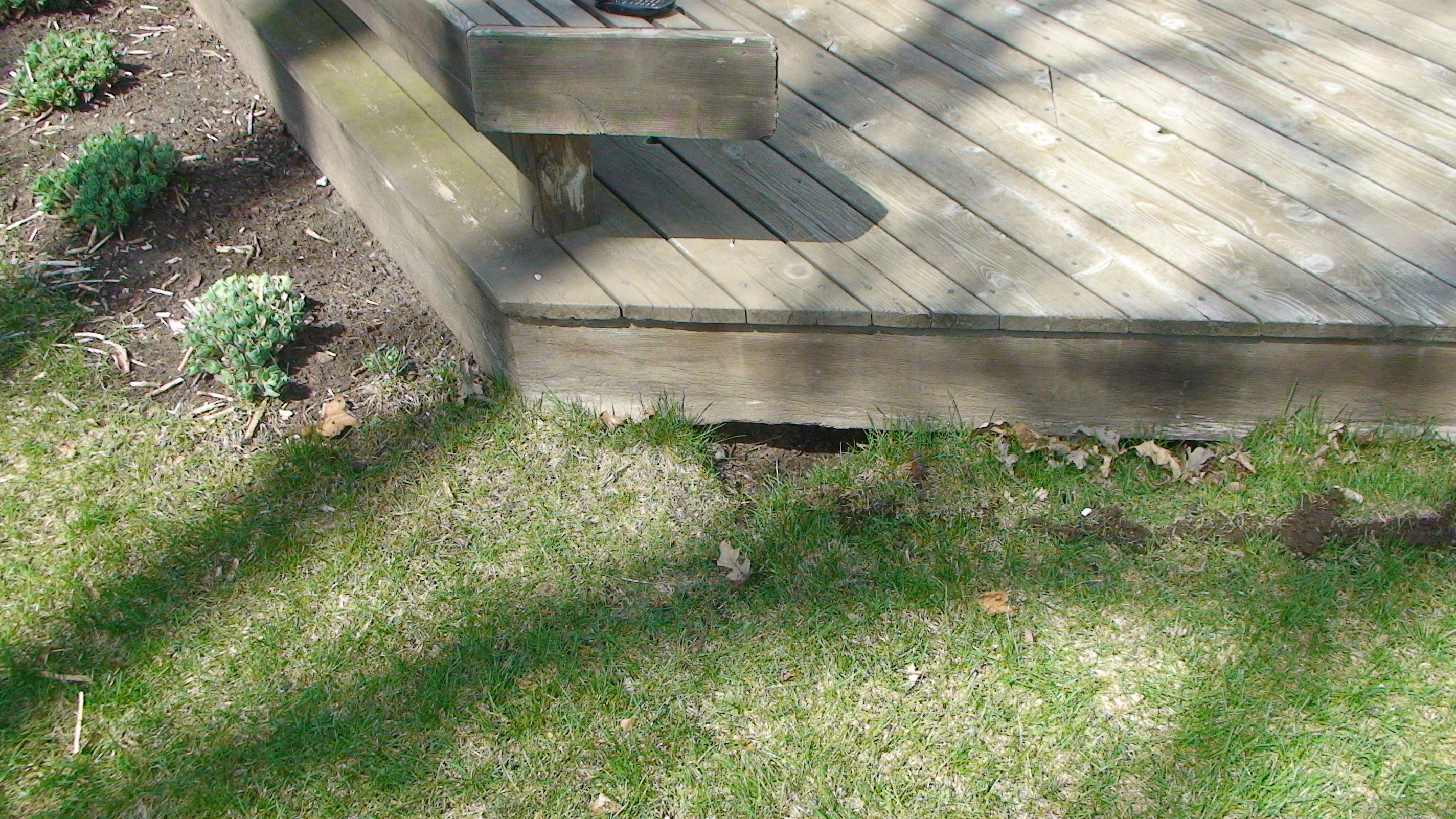

If there are skunks under your shed, house, or deck, the situation becomes a little more complex. They've made themselves comfortable, and it's not quite as easy to get them to leave.
Search your property for dens, and apply the repellents around the opening. Predator urine in particular, is great at driving skunks out of their den, but they'll soon return.
You'll have to close the hole up once you're certain that it's empty, and continue applying repellents around the opening of the den.
Using Catch & Release Traps For Skunks
If nothing else has worked, setting up catch and release traps may be your last hope. They're highly effective, but it's not without it's drawbacks. You'll have to go out of your way to not get sprayed while you transport and release the skunks.Check your local and state laws regarding the trapping of skunks before proceeding.
How To Trap Skunks
The first thing you'll want to do is pick out a skunk trap. The ideal size for a live skunk trap is large enough for them to move around somewhat comfortably, but small enough that they aren't able to lift their tail up super high to spray.
Skunks are far less likely to spray you if their tail can't lift up all the way!
What Bait To Use For Skunks
It's important to use the proper bait when trying to catch a skunk. Some reliable options include:
- Canned Sardines
- Cat Food
- Bacon
- Bread and Peanut Butter
- Insect Larvae
- Chicken
How To Set Up The Trap
Set the skunk trap up close to their den, or anywhere that you know the skunks are frequenting. Do this in the evening, checking the trap in the early morning.
Where and How To Release Skunks
Once the skunk has been caught, approach the trap carefully and calmly. Be sure to bring a towel or blanket to drape over the top of the cage. This discourages spraying, and calms the animal down.
Like most wild animal releases, you don't want to take the skunk too far away from your home, but you don't want to drop them off a block away either. If the skunk can't find it's way back to the area they're familiar with, they may starve and die. You must also take into account the possibility of the skunk having kits to care for. When in doubt, call your local animal control. They will help you figure out the best course of action.
The key to the catch and release method is to protect your yard after releasing the skunk a couple of miles away. Should they find their way back to your home, you won't want them doing right back to their old ways. Set up better fencing, or use plenty of repellents and deterrents.
Frequently Asked Questions
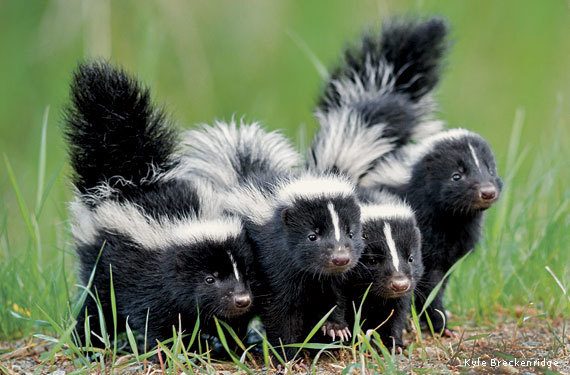
What will keep skunks away?
Frequent applications of homemade repellents, or infrequent applications of commercial repellent spray should suffice in keeping skunks away.
If the problem persists, there may be open food or water sources that you're unaware of. Be diligent about removing attractants.
Is it legal to kill skunks?
We never advocate the killing of any wild animals at Predator Guard. Every animal plays an important role in the ecosystem of your area. As far as laws go, check your local and state laws regarding the protection of skunks. Spotted skunks in particular are fully protected in most states.
Should I use skunk poison?
Poison of any kind isn't advised, not only because it poses a threat to the skunks you're trying to get rid of, but to the plants, pets, and other animals in your area. It's a health risk to everyone involved.
Considering there are ways to get rid of skunks without the use of poison, we urge you to at least explore those opportunities first.
Do skunks bite?
Skunks are not typically aggressive, and biting is rare. Most cases of skunks biting humans has occurred when the animal is infected with the rabies virus.
If you're worried about your pets, they're far more likely to simply get sprayed by a skunk than bit.
When do skunks have babies?
Skunks breed in the late winter, typically in February and March. The gestational period for female skunks is roughly 60 to 75 days, with an average litter size of 6 to 8 kits.
Do moth balls work to keep skunks away?
Moth balls can work to keep skunks away, but they're not the most effective or natural solution. They're highly toxic, and when you're around them, you're essentially inhaling insecticide. They're bad news for your garden, pets, and your family's health.
When do skunks come out?
Skunks are active all year long, and they don't hibernate, though they do sleep longer during the Winter. They're nocturnal, meaning they're most active at night. This means you're far more likely to smell skunks on your property, than you are to see them.
Are you dealing with skunks on your property? What methods have been most effective for you? Which methods didn't work? Let us know in the comments below!
If you liked this post, don't forget to pin it for later:
